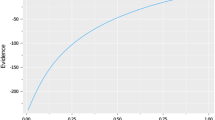Abstract
In this paper, we study the MDPDE (minimizing a density power divergence estimator), proposed by Basu et al. (Biometrika 85:549–559, 1998), for mixing distributions whose component densities are members of some known parametric family. As with the ordinary MDPDE, we also consider a penalized version of the estimator, and show that they are consistent in the sense of weak convergence. A simulation result is provided to illustrate the robustness. Finally, we apply the penalized method to analyzing the red blood cell SLC data presented in Roeder (J Am Stat Assoc 89:487–495, 1994).
Similar content being viewed by others
References
Akaike H (1973) Information theory and an extension of the maximum likelihood principle. In: Petrov BN, Csaki F (eds) Second International Symposium on Information Theory. Akademiai Kiado, Budapest, pp 267–281
Basu A, Harris IR, Hjort NL, Jones MC (1998) Robust and efficient estimation by minimizing a density power divergence. Biometrika 85:549–559
Billingsley P (1999) Convergence of probability measures, 2nd edn. Wiley, New York
Choi K (1969) Estimators for the parameters of a finite mixture of distributions. Ann Inst Stat Math 21:107–116
Clarke BR, Heathcote CR (1994) Robust estimation of k-component univariate normal mixtures. Ann Inst Stat Math 46:83–93
Cutler A, Cordero-Braña OI (1996) Minimum Hellinger distance estimation for finite mixture models. J Am Stat Assoc 91:1716–1723
Demsper AP, Laird NM, Rubin DB (1977) Large maximum-likelihood from incomplete data via the EM algorithm. J R Stat Soc B 39:1–38
Fujisawa H, Eguchi S (2005) Robust estimation in the normal mixture model. J Stat Plan Inference (to appear)
Hathaway RJ (1985) A constrained formulation of maximum-likelihood estimation for normal mixture distributions. Ann Stat 13:795–800
Heckman J, Singer B (1984) A method for minimizing the impact of distributional assumptions in econometric models for duration data. Econometrica 52:271–320
Hjort NL (1994) Minimum L2 and robust Kullback–Leibler estimation. In: Lachout P, Vis͂ek JÁ (eds) Proceedings of the 12th Praque conference on information theory, statistical decision functions and random processes. Prague Academy of Sciences of the Czech Republic, pp 102–105
Jewell NP (1982) Mixtures of exponential distributions. Ann Stat 10:479–484
Kiefer J, Wolfowitz J (1956) Consistency of the maximum likelihood estimator in the presence of infinitely many nuisance parameters. Ann Math Stat 27:887–906
Laird NM (1978) Nonparametric maximum likelihood estimation of a mixing distribution. J Am Stat Assoc 73:805–811
Leroux BG (1992) Consistent estimation of a mixing distribution. Ann Stat 20:1350–1360
Lindsay BG (1983) The geometry of mixing likelihoods: a general theory. Ann Stat 11:86–94
McLachlan G, Peel D (2000) Finite mixture models. Wiley, New York
Pfanzagl J (1988) Consistency of maximum likelihood estimators for certain nonparametric families, in particular: mixtures. J Stat Plan Inference 19:137–158
Redner R (1981) Note on the consistency of the maximum likelihood estimate for nonidentifiable distributions. Ann Stat 9:225–228
Redner R, Walker HF (1984) Mixture densities, maximum likelihood and the EM algorithm. SIAM Rev 26:195–239
Roeder K (1994) A graphical technique for determining the number of components in a mixture of normals. J Am Stat Assoc 89:487–495
Schwarz G (1978) Estimating the dimension of a model. Ann Stat 6:461–464
Scott DW (1998) Parametric modelling by minimum L2 error. TR 98-3, Rice university, Houston
Scott DW (2001) Parametric statistical modelling by minimum integrated square error. Technometrics 43:274–285
Simar L (1976) Maximum likelihood estimation of a compound Poisson process. Ann Stat 4:1200–1209
Sundberg R (1974) Maximum likelihood theory for incomplete data from an exponential family. Scand J Stat 1:49–58
Terrell GR (1990) Linear density estimates. In: Proceeding if the statistical computing section, American Statistical Association, pp 297–302
Woodward WA, Parr WC, Schucany WR, Lindsay H (1984) A comparison of minimum distance and maximum likelihoodestimation of a mixture proportion. J Am Stat Assoc 79:590–598
Author information
Authors and Affiliations
Corresponding author
Additional information
This research was supported (in part) by KOSEF through Statistical Research Center for Complex Systems at Seoul National University.
Rights and permissions
About this article
Cite this article
Lee, T., Lee, S. Consistency of minimizing a penalized density power divergence estimator for mixing distribution. Stat Papers 50, 67–80 (2009). https://doi.org/10.1007/s00362-007-0062-7
Received:
Revised:
Published:
Issue Date:
DOI: https://doi.org/10.1007/s00362-007-0062-7




